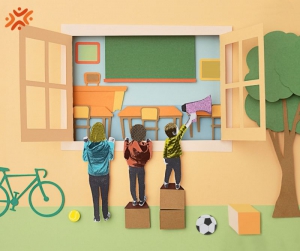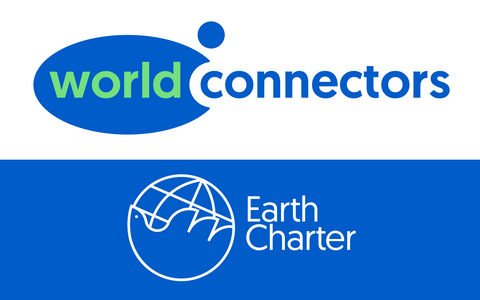Wat zijn de hete hangijzers binnen de Sustainable Development Goals (SDGs)? En hoe werken de Worldconnectors zelf aan het behalen van de doelen? Stagiair Ronald Zwarteveen duikt samen met de Worldconnectors in de SDGs. Andrée van Es, voorzitter van de Nationale UNESCO Commissie, en Marieke Brugman van de Nationale UNESCO Commissie, vertellen in dit artikel over de bijdrage van UNESCO aan de SDGs.
In 2015 zijn de SDGs geïntroduceerd, als opvolger van de MDGs. Wat zijn de sterke punten van deze doelen?
Andrée: De MDGs kwamen als een grote klap rond de millenniumwisseling. Het was iets nieuws en ik denk ook wel dat er een paar forse klappen gemaakt zijn. De SDGs volgen als tweede stap en hebben daarbij de uitdaging om het momentum van de MDGs vast te houden. Daarnaast moest het ook uitgebreid worden. Dat is ook meteen het zwakke punt van de SDGs: het zijn er erg veel en je moet van goede huize komen wil je ze allemaal kunnen doorgronden. Maar het sterke punt is dat het ook doelen voor iedereen zijn. Ik vind het daarbij razend knap om per doel in één of twee zinnen uit te kunnen leggen wat je wereldwijd wilt bereiken, dat vind ik goed gelukt.
Doel 4 gaat over onderwijs, waarom is dit zo belangrijk?
Andrée: Het is natuurlijk de core business van UNESCO. In ons deel van de wereld kennen de mensen UNESCO van het erfgoed. Wanneer je bijvoorbeeld verder naar het zuiden kijkt, kennen mensen ons voornamelijk van het onderwijs. De onderwijsdoelstellingen en onderwijsactiviteiten van UNESCO zijn het allerbelangrijkst van de organisatie. SDG 4 sluit goed aan bij de activiteiten van UNESCO en we lopen daarom ook voor in de uitvoering daarvan.
Marieke: Ik vind het daarbij mooi dat in tegenstelling tot de MDGs, de SDGs voor iedereen zijn. Niet alleen voor de landen in ontwikkeling, maar ook voor Nederland. Zo kunnen we binnen het UNESCO-Scholennetwerk aangeven: de SDGs zijn ook voor jullie, waar kunnen we nog verbeteren?
Andrée: En dan zie je dat als het in Nederland gaat over alfabetisering en laaggeletterdheid, het een enorme steun in de rug is voor de scholen en organisaties die daar mee bezig zijn.
Hoe werkt UNESCO aan dit doel?
Andrée: Wereldwijd is er natuurlijk heel veel aandacht voor laaggeletterdheid. Maar binnen Nederland is bijvoorbeeld Prinses Laurentien vertegenwoordiger van UNESCO. We ondersteunen verschillende organisaties op tal van manieren, bijvoorbeeld de Stichting Lezen en Schrijven.
Marieke: Verder kijken we met het UNESCO-Scholennetwerk welke kansen er nog liggen om bijvoorbeeld iedereen gelijke kansen op onderwijs te geven zodat er geen talent verloren gaat. Dat zit natuurlijk heel nadrukkelijk in SDG 4: toegankelijkheid voor iedereen. Zou dan bijvoorbeeld een tweejarige brugklas helpen? Op die manier werken we heel concreet aan dit doel.
Welke successen zijn er reeds door UNESCO gehaald met betrekking tot dit doel?
Marieke: Wereldwijd speelt UNESCO een grote rol bij de wederopbouw in crisisgebieden. In Afghanistan heeft UNESCO bijvoorbeeld een grote bijdrage geleverd. Het gaat daarbij niet om het bouwen van scholen, dat doet Unicef, maar om het beleid en de planning van de lokale overheden: hoe krijg je het onderwijs weer draaiende? Vooral tijdens de MDG periode zijn hier veel successen behaald, waarbij de toegankelijkheid van onderwijs sterk is verbeterd.
Welke concrete kansen liggen er nog om het onderwijs te verbeteren in Nederland?
Andrée: De laaggeletterdheid is in Nederland is in 15 jaar tijd gegroeid van 1 miljoen mensen naar 2,5 miljoen mensen. Dat heeft veel te maken met immigratie, veel jonge kinderen komen niet van school thuis met voldoende lees- en schrijfvaardigheden. Ik vind dat voor een ontwikkeld land als Nederland shockerend.
Marieke: En daarbij blijven er een hoop onder de radar.
Andrée: Klopt, we zijn natuurlijk geneigd bij laaggeletterdheid te denken aan opa’s en oma’s die hun hele leven lang hebben weten te verbergen slecht te zijn in lezen en schrijven, maar je ziet dat het nu bij een jonge generatie voordoet. Het is een heel concreet onderwerp om nu aan te pakken.
Marieke: Dit heeft ook te maken met het feit dat hoog- en laagopgeleiden steeds verder uit elkaar trekken in Nederland. Er vormt zich als het ware een nieuwe verzuiling, ze leven elk in hun eigen bubbel. Daardoor zijn ze al van jongs af aan voorbestemd voor een andere toekomst. Met de SDGs bij de hand is dit ook iets wat je concreet kan aanpakken.
UNESCO werkt ook aan doel 16: vrede, veiligheid en rechtvaardigheid, op welke manier?
Andrée: Aan de wieg van UNESCO stond het vredesdenken: nooit meer oorlog. UNESCO denkt daarbij voornamelijk in termen als rechtstaat, goed onderwijs en democratie. Praten is beter dan schieten. Wetenschap speelt daarbij ook een rol. Hoe zorg je er nou voor dat iedereen toegang krijgt tot wetenschap? Wetenschap zou een recht moeten zijn voor iedereen. Het kan een grote rol spelen om mee te kunnen praten over vrede.
Stel dat er een doel of target zou mogen worden toegevoegd aan de SDGs, welke zou dat dan zijn?
Marieke: Cultuur zou meer aandacht mogen krijgen. Cultuur kan als een verbindende rol fungeren.
Andrée: Zonder cultuur gaat het niet, dat wordt nog wel eens vergeten. Het kan een grote rol spelen om bijvoorbeeld de sociale cohesie in een wijk te bevorderen.
Hoe ziet u 2030 voor u in 1 woord?
Andrée: Dapper voorwaarts.
Ik heb het idee dat het twee kanten op kan gaan: meer nationalisme en meer oorlog. Maar op het gebied van klimaat heb ik het gevoel dat we de komende tijd echt wat gaan bereiken.
 In Nederland heeft ieder kind recht op en toegang tot onderwijs, maar hoe inclusief is dat onderwijs eigenlijk? Versterkt het systeem en dat wat ze leren ten volle het potentieel van kinderen, met name als het gaat om het aanbieden van een inclusieve en warme samenleving? Dat is waar deze kwestie over gaat. Het LabTG heeft onderzoek gedaan en is uiteindelijk tot deze uitspraak gekomen, waarbij de impact van doen of nalaten nu op het welzijn van toekomstige generaties wordt onderzocht en beoordeeld.
In Nederland heeft ieder kind recht op en toegang tot onderwijs, maar hoe inclusief is dat onderwijs eigenlijk? Versterkt het systeem en dat wat ze leren ten volle het potentieel van kinderen, met name als het gaat om het aanbieden van een inclusieve en warme samenleving? Dat is waar deze kwestie over gaat. Het LabTG heeft onderzoek gedaan en is uiteindelijk tot deze uitspraak gekomen, waarbij de impact van doen of nalaten nu op het welzijn van toekomstige generaties wordt onderzocht en beoordeeld.

